
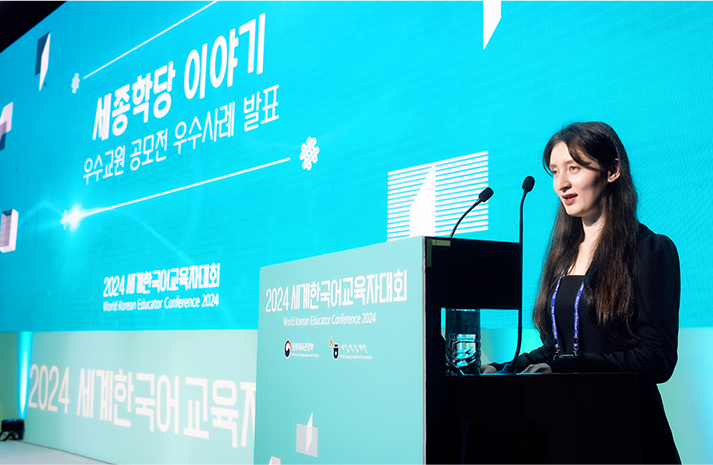
Meeting Dilbar, the Winner of the Minister of
Culture, Sports, and Tourism Award from the
“World Korean Educator Conference 2024”
Outstanding Instructor Contest
Instructor Baimaganbetova Dilbar from the KSI Korean Cultural Center, Kazakhstan, won the Minister of Culture,
Sports, and Tourism Award at the “World Korean Educator Conference 2024” Outstanding Instructor Contest. As the
first foreign recipient and someone who has grown from a learner at the KSI to an outstanding instructor, this
award holds special significance. We spoke with Instructor Dilbar about her feelings on receiving the award and
her journey of growth as a teacher.
Hello, Baimaganbetova Dilbar! Could you please introduce yourself to the readers of 〈Monthly Knock Knock〉?
Hello! I’m Baimaganbetova Dilbar, who started as a learner at the KSI Korean Cultural Center, Kazakhstan and am
now a Korean language instructor. I enrolled at Eurasia National University in 2014. At the time, my major
wasn’t Korean, but in my first semester, I heard that KSI instructors were teaching Korean at the university.
Out of simple curiosity, I signed up for the class, even though I didn’t know much about KSI or the Korean
language back then.
However, from the first class, I was completely captivated by the charm of the Korean language, and I even
changed my major to Korean. It wasn’t easy to switch majors after entering university, but I used my vacation
periods to catch up on what I lacked in studies and consistently worked hard, eventually completing a master’s
degree in Korean Studies at the Faculty of Oriental Studies at Eurasia National University in 2021.
Did you originally plan to become a Korean language instructor when you changed your major to Korean Studies?
What made you decide to become a Korean instructor at KSI?
Although I changed my major, I didn’t initially plan on becoming a Korean language instructor. I vaguely thought
I would work for a Korean company in Kazakhstan or at the embassy. In fact, after finishing my undergraduate
studies in 2018, I worked for a Korean company for a short time. During the day, I worked, and in the evening, I
studied Korean at KSI because I felt my speaking skills and advanced vocabulary were lacking.
Then, in 2019, Kim Mi-jung teacher came to the KSI Korean Cultural Center, Kazakhstan. From the very first
class, I thought she was an amazing instructor. Typically, classes can be rigid and boring, especially when the
content is difficult, but her classes were nothing like that. She explained complex topics as if by magic,
making them easy to understand, and she gave us a lot of motivation. At the KSI Korean Cultural Center in
Kazakhstan, there were no more classes available after completing the Sejong Korean 6A course, so most learners
had to stop studying Korean and prepare for the TOPIK (Test of Proficiency in Korean) exam on their own.
However, Ms. Kim created a special class for students who had completed the 6A course. On days when no
classrooms were available, we would study for hours in a café. She even offered additional weekend classes to
ensure we didn’t give up on our dreams of mastering Korean. Thanks to her, most of the learners in our class
were able to pursue their studies in Korean universities or graduate schools.
I think it was around that time that I began to seriously consider becoming a Korean language teacher. I thought
it would be wonderful to teach Korean and share Korean culture in an enjoyable way, just like Ms. Kim did. More
than anything, I wanted to be a teacher who, like her, would stay by my students’ sides and help them every step
of the way.
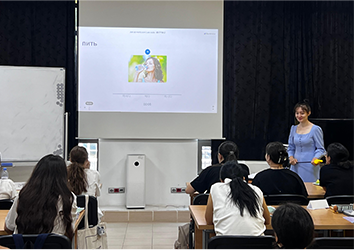
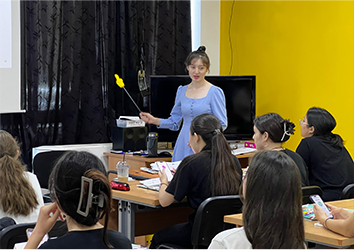
Baimaganbetova Dilbar Teaching Students at KSI Korean Cultural Center, Kazakhstan
You decided to become an instructor, but it must not have been easy to actually become a Korean language
teacher. Can you share the process of becoming a KSI Korean instructor? Were there any specific challenges you
worked hard to overcome?
I started working as a Korean language instructor at the KSI Korean Cultural Center, Kazakhstan in September
2019, so it’s been almost four years now. At that time, I was working at a company during the day and studying
Korean at KSI in the evening. I wasn’t going to the office every day, but I was working as a translator whenever
Korean staff visited. Then I saw a job posting from the KSI Korean Cultural Center in Kazakhstan looking for a
local instructor, and I immediately began preparing for the interview. I remember memorizing beginner grammar
from scratch, just like when I first started studying Korean, and I stayed up all night before the interview
preparing.
Learning Korean is by no means easy. You must understand Korean culture and how Koreans think to use the
language naturally. One of the challenges of becoming an instructor was preparing for the TOPIK (Test of
Proficiency in Korean) exam, which was not easy. I failed several times before finally passing Level 6, which is
required for becoming a Korean instructor. Even though I memorized 100 words a day and three grammar points a
week, my TOPIK score didn’t improve much. It was so frustrating because I couldn’t figure out what the problem
was. Then, I met people with similar struggles, and we studied together with Instructor Kim Mi-jung every
weekend. Gradually, my skills improved, and I finally passed TOPIK Level 6.
You recently won the Minister of Culture, Sports, and Tourism Award, the highest honor at the “World Korean
Educator Conference 2024” Outstanding Instructor Contest. Congratulations! How did you feel when you were
announced as the winner? Could you share your thoughts on receiving the award?
Honestly, I didn’t even expect to win an encouragement prize, so I had no expectations when I checked my email.
But when I saw my name on the list of winners, especially as the top winner, I was so shocked. I couldn’t
believe it and re-read the list multiple times. I was so happy that I almost screamed. Even now, it doesn’t feel
real. I haven’t won many awards in my life, so receiving the Minister of Culture, Sports, and Tourism Award was
an incredible surprise. The first thing I did was share the good news with my parents, and I also expressed my
gratitude to the director of the KSI Korean Cultural Center, Kazakhstan for giving me the opportunity to
showcase my skills.
Dilbar receiving the Minister of Culture, Sports, and Tourism Award at the “World Korean Educator Conference
2024” Outstanding Instructor Contest
Can you tell us about the content of your submission that led to winning the Minister of Culture, Sports, and
Tourism Award?
My submission was about my teaching methods. As a learner at KSI, I always wanted to be a teacher who could
explain complex grammar and vocabulary in a simple way. So naturally, I thought a lot about teaching methods.
When I was a student, Instructor Kim Mi-jung often showed us videos or news about Korean life that weren’t in
the textbooks. However, most of the students I teach are beginners, so I felt the need for something more
engaging to capture their attention. That’s when I introduced ‘game-based teaching methods’ into my lessons.
In the contest, I presented how specific games could help students learn various aspects of Korean in a fun and
effective way. For example, we used name tag ripping games, often seen on Korean variety shows, or word card
missions to help students learn Korean naturally. When using word cards, I would group the students into teams
of three or four and assign different tasks, making sure even the less proficient students could participate.
Teaching through games helps students feel less intimidated by Korean, allowing them to learn in a fun and
relaxed environment.
How did the atmosphere in your classes change after you started using game-based teaching methods?
Student attendance has definitely improved, and their vocabulary skills have increased significantly. Before I
applied the game-based teaching method, many students would get bored or even fall asleep during class. Of
course, that still happens occasionally, but when it does, I introduce a short game to wake them up. The
students quickly become more engaged. These activities also help strengthen the bond between the instructor and
students. Through these games, students feel more relaxed and comfortable in their studies without the stress of
formal learning.
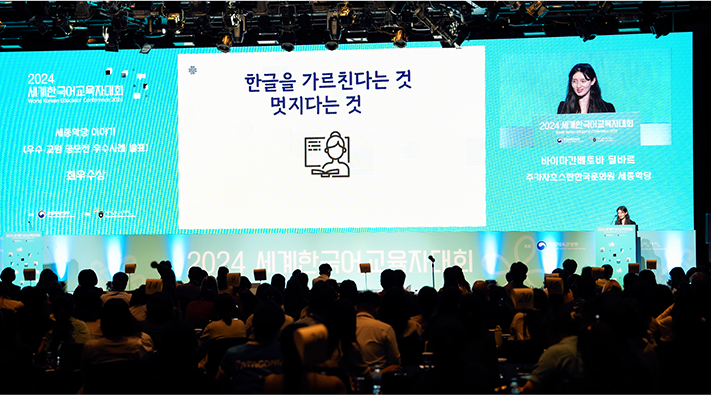 Dilbar presenting her 〈Game-Based Teaching Method〉, which was selected as an outstanding example at the “World
Korean Educator Conference 2024”
Dilbar presenting her 〈Game-Based Teaching Method〉, which was selected as an outstanding example at the “World
Korean Educator Conference 2024”
When do you feel most fulfilled working as a Korean language instructor at KSI?
When students who didn’t know any Korean at all can communicate in Korean after just one semester at KSI, it’s
incredibly rewarding. They become able to read and write in Korean, and they’re thrilled when they start to
understand bits and pieces of what their favorite idols or celebrities are saying. Seeing the joy and excitement
in their eyes at those moments gives me a deep sense of fulfillment.
Also, the Korean speech and writing contests hosted by KSI are great motivators for the students. Watching them
study Korean diligently in preparation for these competitions makes me proud, as I feel like I’m helping them
achieve their dreams.
What does KSI mean to you?
KSI is where I first started learning Korean. From my first year of university until I became a Korean language
instructor in 2019, I continued to attend the KSI Korean Cultural Center, Kazakhstan, gaining countless
experiences and growing throughout the process. I also met many wonderful teachers there, and through them, I
learned how to treat and respect students. They taught me how much time and dedication it takes to ensure
students don’t give up on learning Korean, even outside of class hours. In that sense, KSI is like a 'teacher'
to me. It’s a place that has worked miracles in my life, transforming it more than once. If KSI hadn’t offered
classes at my university, I might never have switched my major to Korean Studies. And if I hadn’t met such
inspiring teachers at KSI in 2019, I might not have continued studying Korean or realized my dream of becoming a
Korean language instructor.
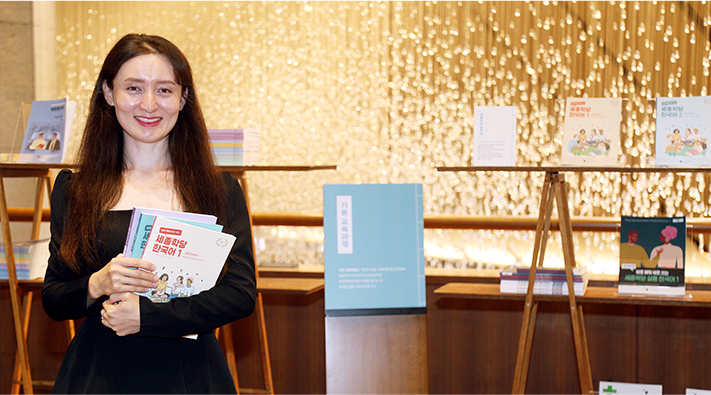
Finally, could you share any goals or plans you have related to Korean language education?
I want to become an even better teacher for my students in the future. I also want to continue thinking of new
ways to make learning Korean even more enjoyable. Rather than being a distant, authoritative teacher, I want to
be respected because of my abilities. When students are on the verge of giving up on their dreams, instead of
just saying, “Keep working hard,” I want to walk alongside them, holding their hands, and supporting them on
their journey. I will strive to be that kind of teacher.